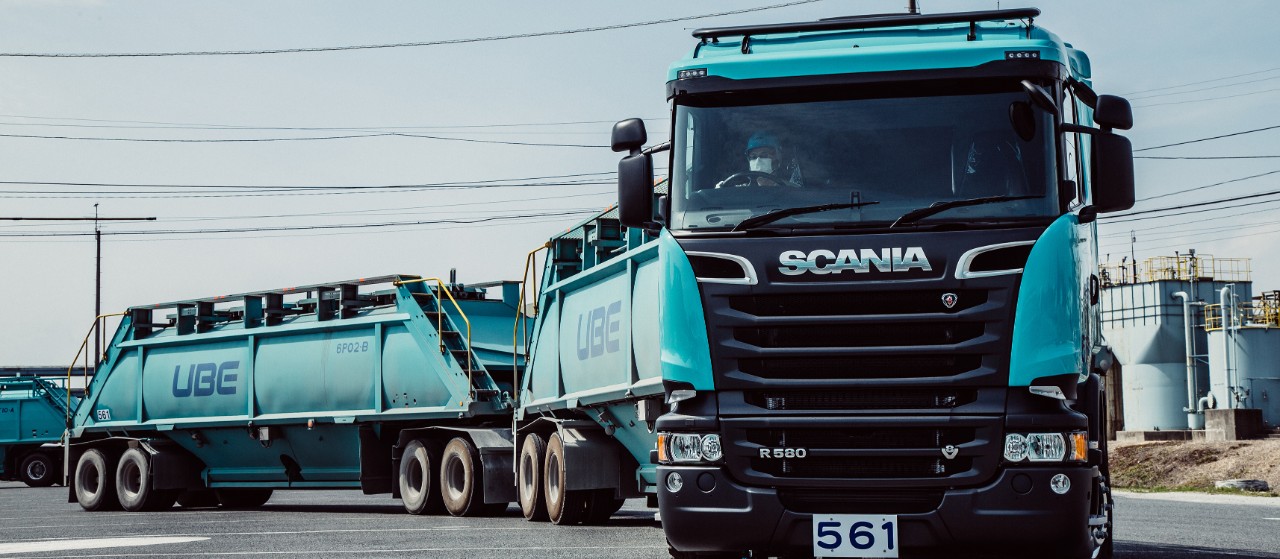
Scania trucks on the world’s longest private track
31 MAY 2017
Sublime journey. Ube Industries has the world’s longest private highway. “What we have is like a test course for new trucks,” says the company’s head of logistics.
The industrial city at the very southern tip of Japan’s main island of Honshū has turned local limestone into cement since the 1920s. Over the years the operation run by Ube Industries has grown so much that almost every aspect of it is gargantuan – from cement kilns to quarries to the transport that carries its 8.4 million tonnes of limestone, coal, and waste product every year.
The road connecting facilities inside the site stretches more than 30 kilometres, making it the world’s longest private track, according to the Guinness Book of Records. The trucks that speed at 70 km/h along it carry 80 tonnes of cargo in 30-metre-long double-trailers.
“If the Ube road is no problem, then everywhere is no problem”
And then there’s the ‘minor’ detail of working its 35-truck fleet trucks every single day, from 06:30 to 21:00, to clock up an annual 180,000 kilometres per machine.
“What we have is like a test course for new trucks,” says Ube Industries logistics and purchasing leader Hideki Shimazu. “If the Ube road is no problem, then everywhere is no problem.”
Putting a truck through its paces in the Ube industrial heartland has many a manufacturer excited, he says, but few can provide the machines that cope with the conditions and meet Ube’s stringent efficiency clauses. In fact, Ube’s active fleet has been whittled down to just three truck brands and each of these has drawbacks.
Domestic truck manufacturers have the service capability and lowest costs, but lag in terms of horsepower. Foreign rivals have the machine power, but no direct distribution and parts supply in Japan.
“English communication is still very difficult,” Shimazu says in English, before breaking into a chuckle.
So, when Ube Industries was introduced to Scania two years ago, Shimazu got interested very quickly.
Scania had a Japanese distribution network, a local corporate entity with staff that could literally speak Shimazu’s language, and a 580-hp, high-torque V8 engine that met Ube’s 500-plus horsepower criteria. It was also affordable.
Ube Industries moved to add two Scania machines to its fleet from March, and two more are due by the summer.
Ube’s drivers are already singing the praises of Scania’s light-touch automated transmission in contrast to the powerful but exhausting manual clutch of another foreign brand currently dominating the fleet.
Less than 68.5 litres per 100 kilometres
For Shimazu, however, it will be a case of judging Scania’s cost performance over the next three years and the total lifespan. Ube uses trucks for eight years before putting them into the spares squadron.
So far, with a fuel consumption of less than 68.5 litres per 100 kilometres, Scania is proving to be one of the most efficient, despite recent model upgrades by rivals. The V8’s high torque means it doesn’t lose out even to a 600-horsepower rival. That and Scania’s use of triple axles allow drivers to navigate inclines on Ube’s road without crimping fuel efficiency.
Scania staff is also advising Ube on ways to keep the cost of replacement parts in check, Shimazu said.
These advantages will be particularly telling as Ube raises the bar. The company is intent on boosting cargo weight without slowing the trucks. From this year Ube’s double-trailer load will rise by 10 percent. Shimazu is also overseeing the reintroduction of triple-trailers, a practice abandoned in 1999 due to frequent power train failures.
“There is a revolution in trucks today,” Shimazu says, adding that this is a chance for Ube to pick a machine for its own next generation of demands.
“Scania is one of the makers I have the best expectations for,” he says.
Japan
Many truckers in Japan wear white gloves as a symbol of their professionalism.
A ‘Dekotora’ is an extravagantly-decorated Japanese truck, inspired by the 1975 film Torakku Yaro (Truck Rascals).